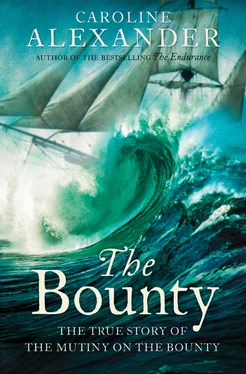To Christian’s request for a position, however, Bligh had returned the polite response that he already had all the officers he could carry. This was undoubtedly true, but the fact that Bligh did not stretch himself to accommodate the eager young man, as he was to do for so many young gentlemen on the Bounty , suggests that he was not in any way beholden to the Christian family; Fletcher had approached Bligh, it would appear, without benefit of interest.
Upon receiving this rebuff, Christian was undeterred; indeed, he rose to the occasion, volunteering to work before the mast until a vacancy arose among the officers.
‘Wages were no object, he only wished to learn his profession,’ he had told Bligh, adding, ‘we Mid-shipmen are gentlemen, we never pull at a rope; I should even be glad to go one voyage in that situation, for there may be occasions, when officers may be called upon to do the duties of a common man.’
To this honourable request Bligh had responded favourably. Christian was taken on board the Britannia as a seaman, and on his return from the West Indies, according to his brother, ‘spoke of Captain Bligh with great respect’. He had worked hard alongside the common sailors, but ‘the Captain had been kind to him’, instructing him in the art of navigation. At the same time Christian had observed ‘that Captain Bligh was very passionate; yet he seemed to pride himself in knowing how to humour him.’ On their second voyage Christian was entered as nominal ‘gunner’ but, as Bligh made clear, was to be treated as an officer. Christian, it would seem, had become Bligh’s protégé. Bligh had taken pains not only to instruct the ambitious young man, but to elevate him, regularly inviting him to join him and his officers at his table for dinner. Christian for his part must have passed muster with his captain, for Bligh was not one to suffer fools, and it was Bligh who recommended Christian to the Admiralty as midshipman on the Bounty. ‘As it was understood that great interest had been made to get Midshipmen sent out in this ship,’ Fletcher’s brother would write, ‘Christian’s friends thought this recommendation…a very great obligation.’ On the return from the South Seas, Fletcher could expect to be promoted to lieutenant.
This promising naval career had not been in the Christian family’s original plans for its second-youngest son; and as the family itself was to play a significant part in the shaping of the events ahead, it is well to introduce its members here. Fletcher Christian was born on 25 September 1764, in his parents’ home in Cumberland, and had been baptized that same day, in Brigham Church, some two miles distant. Baptism on the day of birth was unusual, and implies that the newborn child was not expected to live. His parents, Charles and Ann, had already lost two infants.
Charles Christian came from an old Manx family that had been settled on the English mainland since the seventeenth century. At the age of twenty-two he had married Ann Dixon, the daughter of a dyer and a member of the local gentry well connected with other important north-country families. Ann’s mother was a Fletcher, another old and established Cumberland family. It was after his grandmother’s family that Fletcher Christian was named.
Charles had grown up in the Christians’ ancestral home, Ewanrigg, a forty-two-bedroomed mansion with crenellated battlements overlooking the sea. Reputedly, the property had been won by the Christians from the Bishop of Sodor and Man in a card game. Charles’s mother, Bridget Senhouse, could trace her ancestry back fourteen generations to King Edward I. Such distinctions bore little practical weight, however, and as a younger son (and one of eleven children), Charles inherited only his name and some shares in various family interests. Like all but the eldest son, he was expected to make his own way, which he did as an attorney-at-law, and later as coroner for Cumberland. The main boost to his fortune was his marriage – Ann brought with her a small but respectable property called Moorland Close, just outside Cockermouth, described locally as ‘a quadrangular pile of buildings, in the style of the mediæval manor house, half castle and half farmstead.’ The surrounding wall, originally built to rebuff Scottish border raiders, during Fletcher’s boyhood benignly enclosed an orchard and gardens, while the former guard stand had been converted into a little summer house.
Ten children were born to the young couple, six of whom survived infancy. Fletcher was the fifth surviving child, born twelve years after his eldest brother, John. Although Fletcher was raised in a large family, with cousins and relatives nearby in every direction, his childhood was made precarious by the early death of his father, who passed away in 1768. A month before he died, Charles Christian had written his will declaring himself ‘weak of body’, which suggests a protracted illness.
Ann Christian was now left to raise six children on her own. Fletcher was not yet four; his elder brothers, John, Edward and Charles, were sixteen, ten and six, respectively; his sister, Mary, was eight, while little Humphrey was just three months old. Money was, and evidently had long been, a problem. As early as the year of his first son’s birth, Charles Christian senior had borrowed from his eldest brother, and family records indicate a series of other large ‘loans’ made in later years. Still, under Ann’s management, care was given to Fletcher’s education, and he was sent first to Brigham’s one-room parish school and then to the Cockermouth Free School, which he attended for seven years – and where a younger contemporary was William Wordsworth, the future Poet Laureate.
Cockermouth and Moorland Close stood on the edge of the Lake District, ‘the wildest, most barren and frightful’ landscape in England. Years later, Wordsworth would romanticize and memorialize the savage grandeur of fractured crags and sweeping valleys, scored with streams and dark tarns. Cockermouth, situated against the backdrop of Mt Skiddaw on the Derwent and Cocker Rivers, was by all accounts a pleasant market town, its two main streets lined with stout stone houses roofed with thatch and blue slate.
Little is known of Fletcher Christian’s Cumberland upbringing, but his schoolmate William Wordsworth never forgot the wild freedom this countryside gave his childhood:
Oh, many a time have I, a five years’ child,
In a small mill-race severed from his stream,
Made one long bathing of a summer’s day;
Basked in the sun, and plunged and basked again
Alternate, all a summer’s day, or scoured
The sandy fields, leaping through flowery groves
Of yellow ragwort; or when rock and hill,
The woods, and distant Skiddaw’s lofty height,
Were bronzed with deepest radiance, stood alone
Beneath the sky, as if I had been born
On Indian plains, and from my mother’s hut
Had run abroad in wantonness, to sport,
A naked savage, in the thunder shower.
While Fletcher Christian rode back and forth between the orchards and gardens of Moorland Close to Cockermouth, his two oldest brothers, John and Edward, went off to Cambridge and to professions in law. It was Edward who, as a new Fellow of his college, handled his mother’s affairs when her finances finally and fatally bottomed out. The crisis occurred in 1779, although to judge from the size of her debts it had been building for years. Somehow, together with her eldest son, John, she had managed to accumulate debts to the tune of £6490 os. 11d. The family, it appears, had been living for years with no regard for reality, and now Ann Christian was faced with the humiliating prospect of debtor’s prison. John Christian, her husband’s wealthy brother and head of the family, once again bailed them out, but seems to have made it clear that he could not be counted upon to do so again. In partial compensation, John Christian assumed ownership of Moorland Close and all effects attached to it.
Читать дальше












